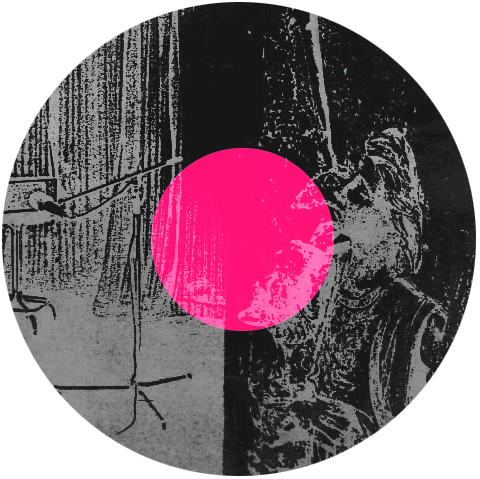Posts on: labour
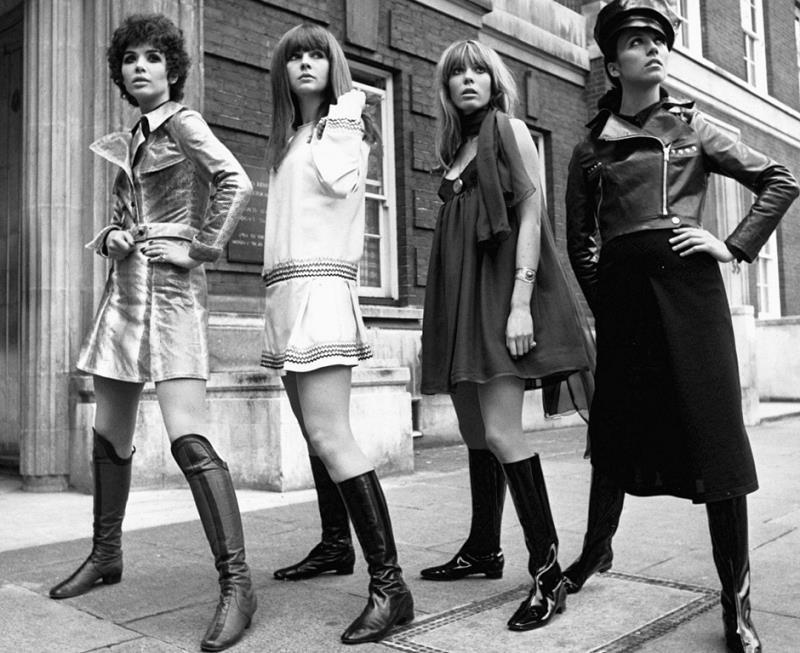
I have never fully understood why revolution is expected to be so drab. The dictatorship of the proletariat has so often been interpreted as the dictatorship of the ugly and shapeless that it begs the question why glamour is anathema to so many advocates of social upheaval? In all of recent revolutionary history the only truly glamorous revolutionaries I can remember - Che notwithstanding, who was handsome but also a scruffy bastard - were the drag queens of Stonewall in Greenwich Village who went toe-to-toe against the homophobia of the NYPD in 1969 and scored a major victory for gay rights and the crucial liberty of sartorial self-expression. Ever since, I have been with them all the way, a true believer in the legitimacy of fighting the good fight in high heels.
…the majority of the up-the-workers Left… seemed totally unaware of the great tradition of the English working class dandy. The wideboys of the Forties, …the teds of the Fifties and the mods of the Sixties were all progressive versions of what Orwell described as ‘young men trying to brighten their lives by looking like film stars’ and George Melly later called ‘revolt into style’. The workers never wanted to look like the proles of Metropolis but they were too wretchedly paid and brutally overworked to do otherwise… One of the great attractions of the Blackshirts was that they offered unemployed louts snappy uniforms. The lone Red of my acquaintance who had both an awareness of power through style and the flash that came with it was a self-proclaimed Stalinist who rode a Triumph Bonneville and favoured Jim Morrison-style leathers and a swan-off Levi jacket, with a hammer and sickle in place of the motorcycle club patch. More than once he told me, ‘I’d join the Hell’s Angels, but it’s the bastards you have to ride with. They don’t have a clue. I mean, how many could I discuss Frantz Fanon and The Wretched of the Earth with?’
– Mick Farren, Give The Anarchist a Cigarette
The above quote, found while trawling the archives of Owen Hatherley’s old blog, succinctly gets to one of the, in retrospect, key limitations of Corbynism (and, by consequence, Starmer’s Labour).
As I have argued previously, the initial promise of Corbyn, when he was first elected, was that he was not just a rejection of the neoliberal status quo at the level of policy, but also – crucially – the level of style and culture. In the early days of his premiership, Corbyn visibly and starkly stood out against the bland austerity-lite managerialists who ran the party at the time. He didn’t look like your boss, but an eccentric regular at an urban greasy spoon, doffing a fiddler cap and filled with secrets and anecdotes from the city’s grimy underworld. Cycling away into the distance, he had lived the life we wanted to live but had always been impeded from doing so by capital: he was one of us, in all our imperfections and rough edges. The difference between him and the grey vultures, circling around the already-ravaged carcass of New Labour, was palpable (as the painfully awkward picture below visualises).
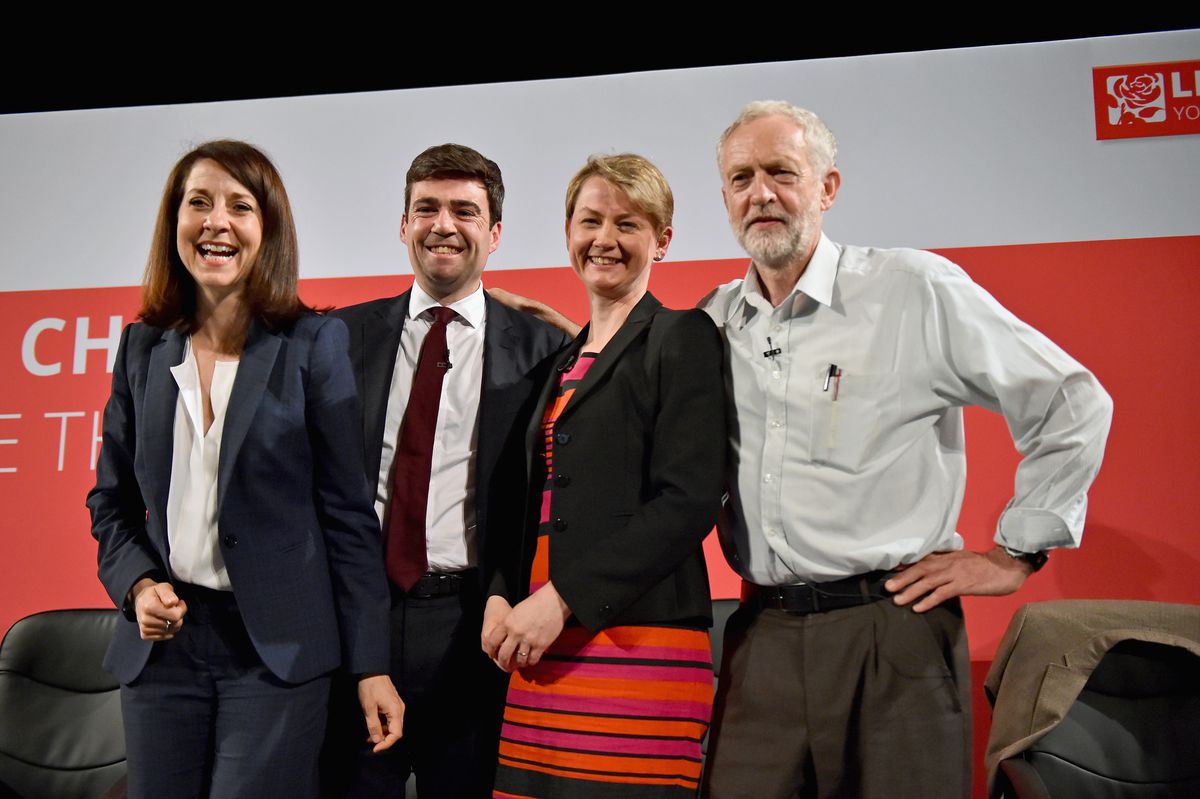
The limitation of Corbyn’s “alternative” style, however, was that it was largely negative in character: it rejected the black suit and white shirt by forgetting the suit altogether and unbuttoning the shirt’s top button, rather than wearing something else entirely (a la Che or the Stonewall drag queens). Hence the frequent denigrations of Corbyn’s “scruffiness” – to be scruffy is always defined in relation to a dominant ideal which it fails to meet through a messy excess (long hair, unclean clothes, etc). The scruffy can be easily denigrated because it is not a style that stands on its own terms – it is only the failure of another, dominant, style.
Instead of continuing this negative trajectory through to its conclusion, however – which would have seen him doubling-down on his scruffiness and lack of “professionalism” in order to create a new, positive, alternative style – Corbyn caved to the neoliberal style council remarkably quickly. Beige suits were replaced by dark ones by the time the 2017 general election campaign came around, and such a stylistic capitulation was only further entrenched by Labour’s success at that election, which ostensibly dictated that the party must look like a “government and waiting” and Corbyn a “future Prime Minister”. Consequently, 2019 election Corbyn seemed to have lost all the spark and difference of 2017 Corbyn: years of “image management” and trying to out-government the government during the charade that was the Brexit withdrawal process had smoothed out all his edges, turning him into just another functioning component of the cynical electoral machine. (Something that unsurprisingly led to Corbynite Labour’s defeat – Corbyn was never elected or designed to be a functioning cog, but a spanner lodged in the mechanism, rupturing and destroying it. This was the role he could convincingly and persuasively play, not “future Prime Minister”.)
Read More »

This is the introduction to what was going to be a longer essay that I started writing about a month and a half ago, but lost its way and I eventually gave up on. It seemed a waste to not do anything with it, though, and I actually think it works better as an isolated fragment. So enjoy…
Read More »
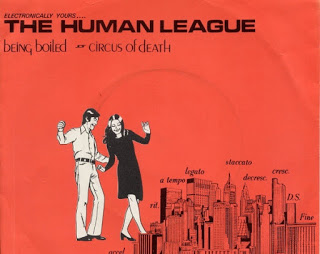
What is Pop? Or equivalently, what is the popular? This is the question Simon Reynold’s book Rip It Up and Start Again forces us to confront, particularly towards the middle of the book, where the focus pivots from post-punk to early 80s New Pop: the moment many post-punk artists such as Scritti Politti and The Human League get tired of post-punk’s puritanical commitment to fringe experimentalism and turn their sights to the mainstream, the popular. What’s valuable about Reynolds account here is that it gives us the perspective of approaching Pop from the outside: we are introduced to a rag-tag clan of artistic misfits who are desperately trying to crack the code of the popular, to break into the Top 40 and become stars, as if it were some alien language beamed in from another galaxy. It is these people, those who consciously have to crack and break into it, who really understand Pop, rather than those who have unconsciously been interpellated or conditioned by it (such as the “popular” kids at school).
This is because the popular – Pop – has very little to do with what “is” popular, statistically and numerically. Pop is not simply a kind of molar statistical aggregate, a name for a thing lots of people know of or do. Commuting to work – to conjure up the most banal example I can – is something millions of people do, but one would really be stretching to call commuting “popular”, or “Pop”. It’s part of the grey background of everyday life: precisely the thing that Pop strives to stand out against and rupture. Pop needs to be a spectacle, a concentrated singularity, quite literally the centre of attention, in order to exist. Pop is a centralisation or it is nothing.
Read More »
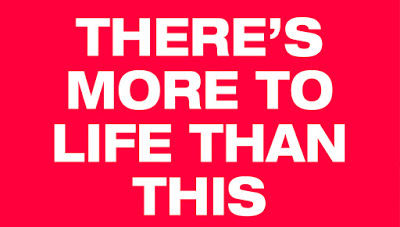
It’s been incredibly humbling over the past few weeks to see people value, share, and stick up the election posters I designed in a spur of the moment one evening, as pictured above. While I of course designed them to go viral, I never actually expected it to happen, let alone become the inspiration for a massive banner made by Manchester Momentum and cited in a recent VICE article by Lauren O’Neill. (I’m yet to get over my excessive self-criticism which deems every piece of work I complete, including this very post, as irrelevant, useless, and a waste of everyone’s time; I’m working on it.)
On an (im)personal level, the posters stemmed from a profound frustration and exhaustion I’ve been feeling over the past few months, as I have transitioned out of the fragile safe-haven of the university and fully into the world of work. Currently I work as a one-to-one teaching assistant in a primary school in South London, specifically supporting a child with global developmental delay, teaching them everyday how to read, write, do maths, and so on. Even though the working conditions of the job are better than many (including myself) have become accustomed to in a precarious economy (I have a contract, a salary, I get paid sick pay, free hot lunches, e.g.), the fact of the matter is that my rent takes up over half my income and I still more or less live paycheque to paycheque, making little savings. Beyond economics, too, the job is absolutely exhausting on a very deep emotional level, and takes significant time and energy away from my weeks that I would much rather prefer to spend doing the things I’m passionate about: writing, studying, creating, and campaigning.
But, as hinted towards above with the “(im)personal”, these struggles are anything but personal and individual. I know for a fact that other workers in the school share my malaise, as do workers in a whole host of sectors in the UK and across the world. “My” exhaustion, depression, anger, are anything but mine: instead they are the impersonal expressions and effects of capital as a virtual body that distributes labour and (re-)production in a specific kind of way. And if those feelings are impersonal, the working of some kind of social machine, then they immediately become a political issue, and the object of intervention for political propaganda and aesthetics. And given the fact there is currently a general election campaign ongoing, where the Labour Party (for all its massive faults and profound limitations) is standing on a programme that could drastically ameliorate these feelings of frustration and transfer power to the working-class in the UK, the posters were the natural outcome of this line of thinking.
kinda wanted to make some election propaganda that didn't take the form of "selling" a policy but more targeted those gut feelings of exasperation, anger, and depression that result from the relentless grind of living under this system every single fucking day pic.twitter.com/zlLfM4JaSO
— state sanctioned content account (@anarchoccruism) November 13, 2019
Demand More
After I posted them on Twitter, I noticed a shared theme among the posters that hadn’t even occurred to me while designing them. Namely, three out of four of posters invoked the notion of more. (Demand more from life; there’s more to life than this; do you really want more of the same?) What is this more? Why is it valuable? Why does it form a part of a radical working-class politics? What do we demand when we demand more? What do we mean when we say “there’s more to life than this”?
Swap out the word “more” for “surplus”, and the way forward here becomes a bit clearer (the concept of ‘surplus value’ is Marxism 101, for example). To have a surplus is to have more than necessary; to have a quantity of something that exceeds the amount needed for a particular task to be completed. A surplus is therefore always defined in relation to a certain task that needs to be completed; it derives its definition from a prior code or programme of use. It’s only possible to define, for example, an office of one hundred computers as having a surplus of computers if it doesn’t have a code of use that incorporates them. Hire more staff, work out things for them to do (a.k.a. incorporate them into a programme/code), and soon enough those computers will no longer constitute a surplus – they’ll just be what’s required to do the job.
Surpluses, therefore, don’t simply possess a quantitative character – they possess a qualitative one too. When a surplus exists, one escapes the logics of pure utility and functionalism and consequently finds themselves on much more open, and creative, terrain. Surpluses are that which escape a code, that a code cannot or does not incorporate, and therefore express what Deleuze and Guattari term in A Thousand Plateaus the “essential margin of decoding” inherent in any code:
The modern theory of mutations has clearly demonstrated that a code, which necessarily relates to a population, has an essential margin of decoding: not only does every code have supplements capable of free variation, but a single segment may be copied twice, the second copy left free for variation. […] Every code is affected by a margin of decoding due to these supplements and surplus values […] (ATP, 61)
In simpler terms, codes are non-exhaustive. Despite their ambitions, they never attain complete control over their inputs and outputs; an office computer may be intended for data entry, but it can also be used by the worker to browse social media and procrastinate at work, or to input false data in a bid to damage the company. The surplus is inescapable: you can block Facebook on work computers, fire trouble-makers, but you will never be able to stop people and things exceeding the code, detaching segments from it and linking them to other codes… there’s always an exit.
Qualitatively, therefore, surpluses express a freedom and openness that comes through an escape from the cold and literal functionalism of the code from which they are defined in relation to. This is the “joy” of surpluses, their ability to augment and increase our capacities to act (think of what you could do with an office full of one hundred computers free to be put to use!)
The “more” we demand thus reveals itself to be an intensive, not an extensive, quantity: an intensive quantity that, like temperature, cannot be increased or decreased without changing the very quality and character of the quantity. This sounds abstract but really is at work in many aspects of our everyday lives; it’s why genuinely free time feels so qualitatively different from time spent at work, for example. Work is boring, repetitive, and homogenous, as the capitalist machine tightly and rigidly organises our time according to a specific code of operation that we are mere cogs of, making labour-time a dull extensive quantity… genuinely free time, meanwhile, is relaxing, adventurous, exciting, heterogenous, intensive. (This is what is what we mean when we say we don’t want more of the same.)
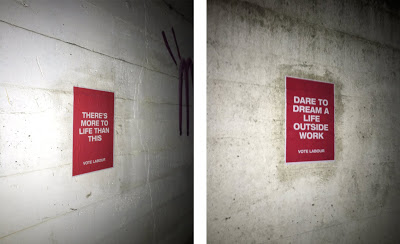
Some of the posters put up by a friend & comrade in a marginal constituency in Chesire.
The Politics of Surplus
It’s perhaps normal to treat surpluses as something exceptional and rare in life, a lucky moment of luxury or convenience that comes along once in a while. But really surpluses are everywhere – and this is where the politics of surpluses comes in. Georges Bataille famously argued in The Accursed Share that economics (and life more generally) in general is not structured around a lack, or scarcity (the so-called “basic economic problem” in mainstream economics), but rather a vast and interminable excess, originating from the superabundance of energy Earth continually receives from the Sun. And this excess is integral to the reproduction of life itself, for without surplus energy, a system/organism cannot grow or reproduce itself. In his words from volume 1:
I will begin with a basic fact: The living organism, in a situation determined by the play of energy on the surface of the globe, ordinarily receives more energy than is necessary for maintaining life; the excess energy (wealth) can be used for the growth of a system (e.g., an organism); if the system can no longer grow, or if the excess cannot be completely absorbed in its growth, it must necessarily be lost without profit; it must be spent, willingly or not, gloriously or catastrophically. (TAS, 21)
As Deleuze and Guattari chart in Chapter 3 of Anti-Oedipus, how surpluses have been produced, distributed and expended is central in determining how societies are organised historically (DGAO, 5). In what they term “savage” or “primitive” societies, for example, surpluses of specific goods are accumulated (such as cattle, yams, or cowry shells) according to local codes of value and significance. These surpluses are not hoarded but become the basis of ritual orgies of waste, expenditure and/or sacrifice (such as the North American potlatch) that are overloaded with meaning and symbolism (DGAO, 64).
Under capitalism, however, surpluses become reduced to mere quantities. Viewed from the inside of capital’s circuitry and operation, the surplus loses all its qualitative magic, symbolism, and freedom. Capital’s continual accumulation, self-expansion and displacement of its limits presupposes a universalisation and homogenisation, enacted through capital-money, which drags all production onto a continuous, divisible line on which all production can be directly compared, measured, and quantified. On this line, surplus can only be expressed and treated as (quantitative) profit, and all surpluses become comparable and equalised to one another (£50million in profits is always worth the same, whether it can from a restaurant chain or an oil company, despite the two qualitatively producing two very different things).
Simultaneously, and by corollary, the surplus’ relation to production and expenditure changes. No longer are surpluses produced to be expended, but instead to produce more surplus. Production is no longer subordinated to consumption/expenditure but to more production, the production enabled by the surplus. Viewed from within (not outside of[^1]) capital’s logic, surplus is no longer than which escapes a code but instead captured by and incorporated into the very axiomatics of capital itself. Indeed, capitalism depends on the decoding effectuated by surpluses and its generalisation throughout society, for it is this decoding that allows production to beget more production, that allows capitalism to always expand and produce more profit. (For a more elegant theoretical explication of this argument, see the “The Civilized Capitalist Machine” section of Anti-Oedipus.)
The correlate of this process is the (re)production of a stratified class structure. For the dragging of all labour/production onto the continuous line, making all labour directly comparable, requires as its condition a monopolistic appropriation: human activities only become capitalist labour when they are made appropriable from the point of view of a monopoly power that fixes in position the boss/bosses/owners of production (ATP, 513; see also the rest of the “Apparatus of Capture” plateau). Labour under capitalism always flows upwards to some one power which stockpiles it; you always labour for someone, your work is always being appropriated; and it is this stockpiling of labour by a monopoly power that enables labour to be directly compared in the first place.
Surpluses in capitalism are therefore not only reduced to quantities, but crucially depend on a monopolistic appropriation in order to be so. In other words, surpluses here only exist when there’s someone to appropriate them (and thus benefit from them). Capital’s “flattening” drive (drawing abstract equivalences between disparate processes of production) is therefore simultaneously matched by a hierarchising one, which institutes apparatuses of capture, control, appropriation and enforcement which are designed to catch, record, code and quantize surpluses so that they can become the basis of further capitalist (surplus-)production. Thus is born the stratified layers of production/labour that motor the capitalist machine, all predicated on the hierarchy worker/boss (which soon enough becomes worker/boss/boss’s boss/boss’s boss’s boss/… and so on). Capital depends on labour, on the working-class, in order to survive, but it does so reluctantly; its real heart is with the tight-arsed, joyless managers, bosses and accountants who make sure any surplus, excess or overflow is going in the most “productive” direction. For their loyal efforts, the boss’s boss then skims off the surplus produced by capturing these surpluses and rewards the boss handsomely with higher wages, more autonomy, better working conditions, promotions, and perks. And so it goes on, up the capitalist chain, surpluses everywhere, always immanently begetting more surpluses… except at the bottom, where the effaced fact of capital’s existence – quantitative surplus(-values) depend on acts of appropriation, capture, control, and perhaps violence in order to exist – lies plain to see, and be experienced. No surplus here, just the primary acts of monopolistic appropriation, control and exploitation that allow the surplus to surface and be captured qua quantitative surplus (profit). Just the barking demands to “get it done”, to do what’s necessary (nothing excessive or outside the normal boundaries, please), from the boss.
Thus emerges the austere quality of pure utility that pervades working-class life – doing what has be done to get by and little else – and the craving for a more that is almost never satisfied. That craving isn’t illusionary, it’s the real desire for the surplus, the escape from the code and the logic of pure utility, that always exists but is systematically blocked to the working-classes (and other oppressed groups) through capital’s working. To be working-class is to be reduced to pure functionality, to be simply operational, to execute orders, to be continuously told by the boss (and the boss inside your head) to simply get the job done. Just do it, get it done, it doesn’t matter why (because knowing or discussing why in any depth isn’t needed to execute the task).
The working-class are those who never or rarely get to experience or enjoy surplus; their only experiences of surplus they have are the traces of its extraction: exasperated sighs, exhausted slumps onto the sofa, evenings vegetating in front of a screen. To be exhausted is to have been extracted from; to have been appropriated and used by capital’s apparatus of capture. The working-class are maintained as an afterthought, a subtraction: “Labour and surplus labour are strictly the same thing […] Surplus labour is not that which exceeds labour; on the contrary, labour is that which is subtracted from surplus labour and presupposes it” (ATP, 514).
To declare “there’s more to life than this” under capitalism is thus to affirm the existence of excesses and surpluses (of value, of energy, of time) as the condition for life itself, and to recognise these surpluses’ qualitative, rather than simply quantitative, character. It is furthermore to recognise that this “more” is not simply some vague hypothetical, but something real and actively blocked to most people under capitalism’s machinations. Above all else it is a demand to ride the decoded flows set in motion by the qualitative surplus in ways that cannot – initially – be apprehended by the capitalist machine, and thereby expose its limits. What would happen if every member of the global working-class were to enjoy the same enjoyment of surpluses, excesses and (perhaps) luxury, both quantitatively and qualitatively, that bourgeois managers and bosses currently do on a regular basis? If everyone was always able to experience the qualitative “more” that so plainly characterises life and reproduction? Capitalism could not accommodate such a system; that’s why we always push further, ride the decoded flows into something beyond capital, demand more.
Notes
[^1] : It’s important to stress the “not outside of” here, otherwise there may appear to be a contradiction with the argument made a few paragraphs above. Surpluses don’t just completely become quantitative and incorporated into capital with the onset of capitalism; such an argument is ridiculous. But viewed from “within” capital, from the viewpoint of capital and the figure of the capitalist, surpluses do appear, and are treated as, quantitative (more production = more money), and this is the point made here.
References
ATP = Gilles Deleuze and Felix Guattari, A Thousand Plateaus. Translated by Brian Massumi. 2013. Bloomsbury: London.
AO = Gilles Deleuze and Felix Guattari, Anti-Oedipus. 1983. University of Minnesota Press: Minneapolis.
TAS = Georges Bataille, The Accursed Share, Volume 1: Consumption. 1988. Zone Books: New York.
DGAO = Eugene W. Holland, Deleuze and Guattari’s Anti-Oedipus: Introduction to Schizoanalysis. 1999. Routledge: London.
Read More »